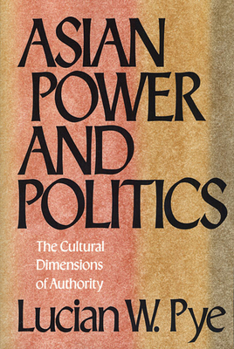Asian Power and Politics: The Cultural Dimensions of Authority
Select Format
Select Condition 
Book Overview
In a major new book, Lucian W. Pye reconceptualizes Asian political development as a product of cultural attitudes about power and authority. He contrasts the great traditions of Confucian East Asia with the Southeast Asian cultures and the South Asian traditions of Hinduism and Islam, and explores the national differences within these larger civilizations.
Format:Paperback
Language:English
ISBN:0674049799
ISBN13:9780674049796
Release Date:March 1988
Publisher:Belknap Press
Length:430 Pages
Weight:1.30 lbs.
Dimensions:1.1" x 6.0" x 9.2"
Customer Reviews
3 ratings
Full of knowledge, judgement, and precision of thought
Published by Thriftbooks.com User , 22 years ago
Books on regions and hence on plural cultures often turn into drivel. As a protection from or over-reaction to drivel others protect themselves by narrowness of model or approach. I get tired of both the drivel books and the tiny narrow rigid ones.This book is full of breadth, comparison, judgement, wisdom, balance, precision and feeling out the boundaries of how ideas mean different things in different contexts and what to do about that. If you live and work in East Asia or have done so, like myself, for 26 years, you rarely find anyone writing who is not taking a few beloved pieces mistakenly for the whole. Pye does not do this. He is careful, very professionally careful, to not mistake pieces for wholes. He has balance and judgement where others have bias and narrow approach. You will get, quickly, in passing when reading particular of his sentences, insights that link phenomena in Korea, Taiwan, Japan, Bali, Tonga, in powerful ways that suggest all sorts of implications and changes in action and strategy for government, business, or career building. Entire books could be developed from single such of his sentences. This is a wonderful book by a person with a wonderful mind. A hundred years from now, it will still tell those generations about East Asian forces, drives, motives, capabilities, and trends.
Superb qualitative study, completely unique
Published by Thriftbooks.com User , 24 years ago
Unlike the previous reviewer, I found Asian Power & Politics to be an incredibly useful study of the underlying currents in Asian cultures. It clearly articulates many social themes which can be "felt" through not often understood by (for example) Western visitors to Asia. No, this is not a dry sholastic tome laden with statistics and demographic data, nor is it a formal sociological study (thank god). Rather, it is an observational study based on Pye's 3 decades of experience, and is much more in the classic style of Levi-Strauss or Clifford Gertz (e.g., social anthropology). As for "empirical data", perhaps the 50 pages of notes is insufficient? In today's America - where the slightest mention of cultural difference is slandered as "racism" or "insult" - some readers will find this book intolerable. But those with a desire to actually understand and embrace cultural distinctions will find it fascinating and full of useful insights.
logic in this work is twisted
Published by Thriftbooks.com User , 26 years ago
A lot of the logic in this work is twisted and convoluted (without historical or empirical evidence). For example:"Asian countries have unity because they share similar hopes for the future." "Japan manifests the essence of the world culture." "Confucianism led to a bold, risk-taking style among the Koreans." "Confucianism led to a sense of nationalism among the Vietnamese."Also, he argues that scholars do not have the right to impose their own culturally limited definitions of power on Asians. But how can we gain knowledge, if precision in terminology is considered ethnocentric? Most of his arguments have no source. He makes broad and sweeping statements, without referring to historical documents. For example, "Most Asians respect authority to much to share the Western distrust of authority and power."He argues that "power" in Asian society resided in successfully performing elaborate rituals. However, I would argue that power resided at the tip of a! samurai sword. But he would say my definition of power is ethnocentric, I suppose. Basically, he needs to throw out all his wishy-washy references to "myth and ritual" and focus on the reality of political life -- which was heavily influenced by conflict. For evidence of conflict in Japanese history see: Najita, Tetsuo and Koschmann, Victor J., Editors. Conflict in Modern Japanese History -- The Neglected Tradition. Princeton: Princeton University Press, 1982He plays "semantic games" by arguing that in "in China power was defined by the ability to select the propitious moment for action. But in the West, this was not the case." Well, he who forms the question wins the argument; of course "good timing" was important in the West -- it just went by a different name.Pye impresses me as a typical psychologist or anthropologist -- definitely not a mainstream sociologist or political scientist.






